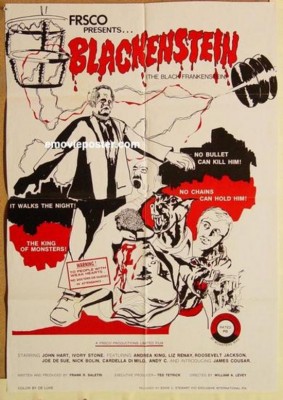| Reviews & Columns |
|
Reviews DVD TV on DVD Blu-ray 4K UHD International DVDs In Theaters Reviews by Studio Video Games Features Collector Series DVDs Easter Egg Database Interviews DVD Talk Radio Feature Articles Columns Anime Talk DVD Savant Horror DVDs The M.O.D. Squad Art House HD Talk Silent DVD
|
DVD Talk Forum |
|
|
| Resources |
|
DVD Price Search Customer Service #'s RCE Info Links |
|
Columns
|
|
|
Blackenstein (The Black Frankenstein)
This partly explains the strange quality of the picture, which other than its black Frankenstein's monster and African-American heroine has none of the genre tropes one associates with ‘70s Blaxploitation, even in scenes that would seem to cry out for some. Conversely, the movie tries (but mostly fails) to emulate the ambiance of Universal's classic monster movies of the 1930s and ‘40s. Certain aspects aren't badly done and the first half-hour actually shows some cleverness and promise, but the picture goes downhill quickly. During the climax I was relieved that the short (78 minutes) feature was nearly over - until I looked at my watch and realized it still had 20 minutes to go. Agony.
Severin's release of this heretofore-obscure title pulls out all the stops: excellent transfer, two cuts, and lots of featurettes.
The picture gets off to a good start, with decent optical effects for the opening titles (the movie's onscreen title: Blackenstein: The Black Frankenstein) and moody shots of the fog-shrouded Los Angeles mansion where the film is set. Based on these effects and cutaways to lightning flashes, one would think the Southland was subject to perpetual pounding rain and dense fog.
Dr. Winifred Walker (Ivory Stone) arrives to ask former mentor Dr. Stein (John Hart, the guy who played The Lone Ranger when Clayton Moore wasn't available) to help her fiancé, hulking but expressionless Vietnam vet Eddie Turner (Joe De Sue, a non-actor client of Saletri's), who lost his arms and legs after stepping on a landmine.
Nobel Prize winner Dr. Stein has "solved the DNA genetic code" and is conducting cutting-edge medical experiments, albeit using Kenneth Strickfaden's 40-year-old electrical zappers to do this, wondrous though they are. (Blackenstein does provide viewers with a rare chance to see them in color.) The movie introduces us to Dr. Stein's assistant, Malcomb (Roosevelt Jackson), and Stein's to resident patients. The first is 90-year-old Eleanor (Andrea King, of The Beast with Five Fingers) who, thanks to Dr. Stein's DNA treatments, passes for a woman of 50, though she needs constant injections or risk aging rapidly to her true age and then some. The other patient is bald Russian Bruno (Nick Bolan, an imposing presence in The Manchurian Candidate). His severed legs have been reattached via "laser beam fusion," but with the odd side effect of turning one into something resembling a striped tiger.
Without a doubt, this was all intended to set-up a climax during which Eleanor would miss her treatment and age suddenly into an old hag, while Bruno would most likely would have become an Island of Lost Souls-type "manimal." Saletri must have run out of money, because none of this foreshadowed action ever occurs.
At the VA hospital, poor, expressionless Eddie is mercilessly taunted in every way imaginable except racially by a white orderly (Bob Brophy) as Dr. Stein and Winifred arrive. Taking him back to the mansion, they begin DNA injection treatments that work wonders indeed; the movie suggests his arms and legs grow back in perfect condition all by themselves.
Completely out of nowhere, manservant Malcomb declares his love for Winifred, and when she explains that she "just wants to be friends" he sabotages her fiancé's treatments, mixing his DNA with Bruno's. Soon enough, Eddie reverts to a primitive state, escapes and turns cannibal besides. First stop, that obnoxious orderly.
Black Frankenstein has some ideas that aren't too terrible. Instead of a Frankenstein's monster constructed from a variety of corpses, Eddie turns into a monster as the result of sabotaged DNA for treatments that might very well have turned out swell. That he would become the spitting image of the classic Universal Frankenstein's monster (more Lon Chaney Jr. than Karloff) is a wild stretch, but the use of DNA genetic code is medical science is a reasonable jumping off point. And making this Frankenstein cannibalistic is also new and mildly interesting.
But the movie's amateurish qualities are ruinous. Ivory Stone is attractive and a decent actress, but the rest of the cast is hopeless. Joe De Sue, as Eddie, barely moves a single facial muscle for the entire film. No expression of bitterness or anger after losing his arms and legs, no feeling of love toward Winifred, no expression of relief, hope or joy when he begins to miraculously recover, and nothing at all when, as the monster, he goes on a rampage.
John Hart played The Lone Ranger for one season of the long-running TV show, then again occasionally as late as a 1982 episode of Happy Days. His build, voice and delivery were similar to Clayton Moore's, but if Black Frankenstein is any indication, as an actor he was terribly limited, though partly the script is to blame. Unusual for a Frankenstein movie, Hart's Dr. Stein isn't evil, obsessed, or resentful that colleagues scoff at his medical innovations. Indeed, he acts like an ordinary surgeon-researcher who just happens to live in a creepy house. He's neither good nor bad, and not at all interesting. Roosevelt Jackson, is nearly as stiff as De Sue, so much so that his love for Winifred comes out of nowhere, without the slightest bit of foreshadowing.
After killing the orderly, the monster's rampage is unmotivated and ponderous, as well as crudely shot compared to the film's better-staged early scenes, another indicator that Saletri was running out of money. Another Saletri client, stripper Liz Renay (former girlfriend of gangster Mickey Cohen), appears briefly as a victim.
Video & Audio
You gotta give Severin Films credit; they pulled out all the stops on this one. There are two cuts: the 78-minute theatrical version (which this reviewer saw) and the longer, 87-minute video release version. The video version alternates between the excellent 1.85:1 widescreen master (reformatted to 1,78:1) of the theatrical version, and a 1-inch videotape source for the added footage. The audio is 2.0 DTS-HD Master Audio mono and uses a lot of library music for most of its score, but the new material by Cardella Di Milo is impressively robust for such a cheap movie.
Extras
The excellent supplements include several new featurettes: "Monster Kid: An Interview with Frank R. Saletri's Sister, June Kirk," "Ken Osborne and Robert Dix Remember Frank R. Saletri," and "Bill Created Blackenstein: An Interview with Creature Designer Bill Munns." Also included is an archive local news report about Saletri's murder, and an original trailer.
Parting Thoughts
An interesting but terrible film, both horror and Blaxploitation fans will still want to give Blackenstein a spin and for them alone it's targeted and Recommended.
Stuart Galbraith IV is the Kyoto-based film historian largely absent from reviewing these days while he restores a 200-year-old Japanese farmhouse.
|
| Popular Reviews |
| Sponsored Links |
|
|
| Sponsored Links |
|
|
| Release List | Reviews | Shop | Newsletter | Forum | DVD Giveaways | Blu-Ray | Advertise |
|
Copyright 2024 DVDTalk.com All Rights Reserved. Legal Info, Privacy Policy, Terms of Use,
Manage Preferences,
Your Privacy Choices | |||||||















